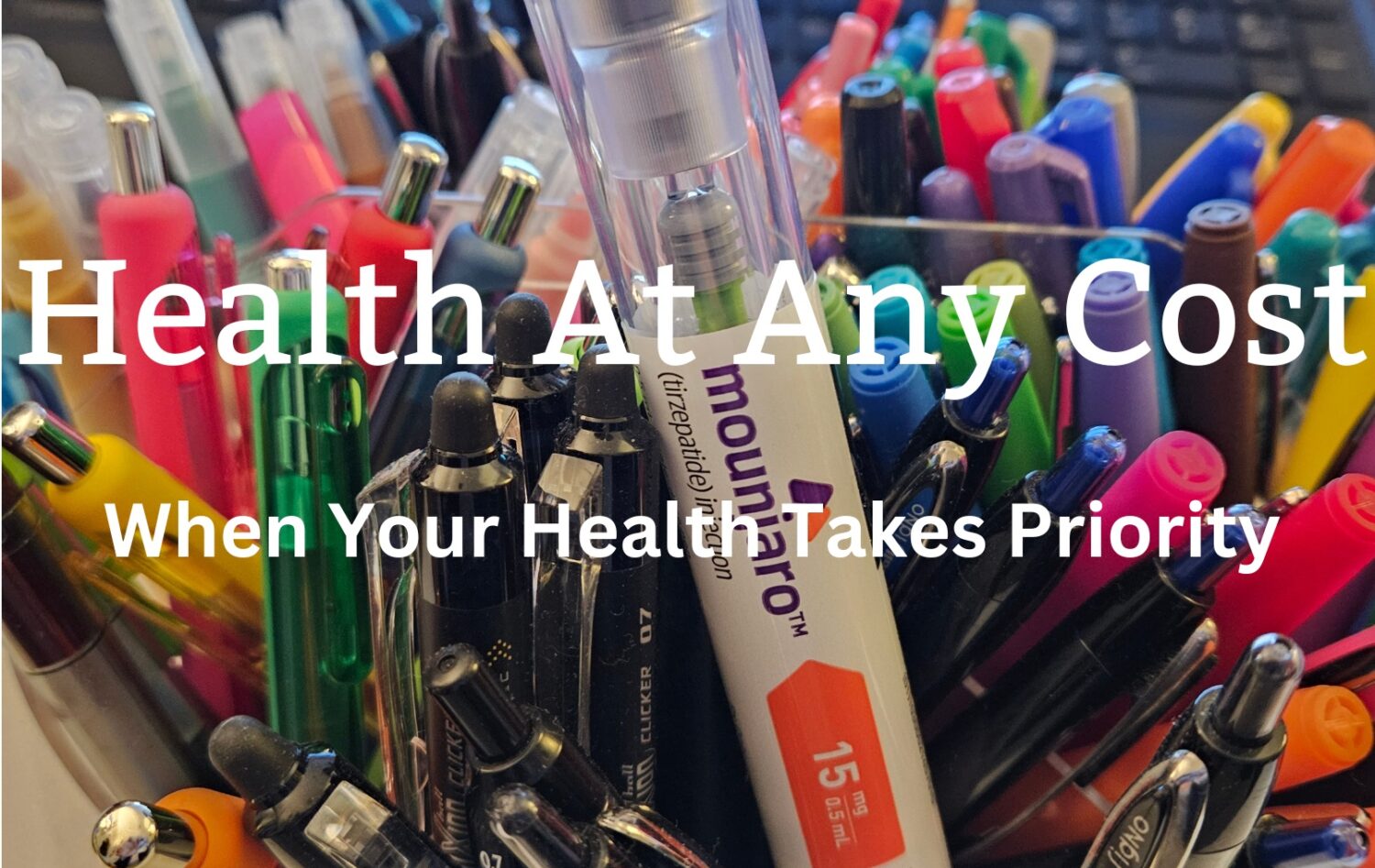CALLING FOR HELP
If you are having feelings of not wanting to be here anymore, please,
please get help.
You can call 988 in the USA and HERE for International Crisis lines.
You are loved and needed and hope can always be regenerated.
You are not alone.
![]()
As the many stories about possible psychological risks for folks on GLP-1s unfold, I have some thoughts.

I’ve got Bipolar Disorder 1 and was diagnosed in 1995. I have been on medication almost continuously and am still on them as I traverse my new GLP-1 world. I was on meds during the Fen-Phen days, after my Roux en Y Gastric Bypass, and now, for 19 months on GLP-1s. Throughout, I have almost continuous hallucinations, usually olfactory and visual, but sometimes tactile. When I tip into mania, the auditory hallucinations add their sounds. I am able to recognize how ill I am by the hallucinations I have.
When I was on Trulicity (taken for a year), things were fairly status quo, but with Mounjaro (the last seven months), it seemed as if a damper had been put on the hallucinations. They seemed… further away, a bit transparent, and not as annoying.
Then, as the shortage hit, I had a month of Ozempic. The hallucinations came roaring back and even after a month on Mounjaro after the Ozempic, I am smelling and seeing things vividly, in my nose and in front of my eyes. Is it a coincidence or was it just my mental illness kicking up from the stress of not being able to get my diabetes medication? Maybe it is all a coincidence and the delusions just decided to wander back after being hushed for so long.
Suicidal Ideation, Suicide Attempts, and Suicide

I hate suicidal ideation. Pondering how to go away forever is annoying. I know what it is when it happens; my mental illness. I am aware that when I start thinking about “un-aliving” myself, it’s time for a medication shift and a few visits to the therapist. Blessedly, I have never listened to those “voices” (not audible, but mental), but it still bugs me a lot.
When I had the Gastric Bypass in 2001, in our support groups online as well as in person, I learned about how depressed many people get after their surgeries. It surprised me until I found myself incredibly anxious the smaller I got, feeling vulnerable and not able to defend myself physically. I was in therapy, but when I got to a size 8 after losing 210 pounds in a little over a year, I had a panic attack and blurted out, “I need to eat some chips.” That day, I began gaining weight again. It took years and a whole gob of therapy to figure out what happened.
It seems it happens to many people who have Weight Loss Surgery. Now we are also watching the discussion of depression and risk of suicide unfold with the GLP-1s as well.
This is not new, people! This is common enough that if you Google “Suicide and Weight Loss” you will find a plethora of studies and commentaries about the subject, some dating back to the early 2000s, and that is just a cursory glance of searching the topic.
From the 2014 article entitled “Heightened suicide risk after weight-loss surgery“:
Among 16,683 who had bariatric surgery between 1995 and 2004, 31 committed suicide by the end of 2006, the researchers found. The data translate into a suicide rate of nearly 14 per 10,000 men per year, and five per 10,000 women each year.
Those numbers are substantially higher than the suicide rates among Pennsylvanians in the same 35-to-64 age range, during the same period. Among all men in the state, the suicide rate in 2005 was 2.5 per 10,000, while the rate among women was 0.6 per 10,000.
Overall, 30 percent of suicides in the surgery group occurred within two years of the procedure, and 70 percent occurred within three years.

Now we are seeing reports of suicidal ideation and suicide in the GLP-1 crowd. Thankfully, these reports go to the FDA and other regulatory offices so research and follow-up can be done.
On March 8, 2024, the FDA said, “The FDA has been evaluating reports of suicidal thoughts or actions in patients treated with a class of medicines called glucagon-like peptide-1 receptor agonists (or GLP-1 RAs). These medicines are used to treat people with type 2 diabetes or to help those with obesity or overweight to lose weight. On January 11, 2024, we are announcing that our preliminary evaluation has not found evidence that use of these medicines causes suicidal thoughts or actions.”
Those of us who have seen new medications put through the public wringer know this examination of GLP-1s is just beginning. I’m watching the results closely. I want and need to know about this, too!
Why Aren’t People Thrilled With Their Weight Loss?
An interesting phenomenon occurs when folks lose weight, especially a lot of weight. Many get depressed.
While there are more recent articles about depression with weight loss, this one bears quoting. I promise, this will not just be familiar to people who have had Bariatric Surgery, but to many of us who have lost weight with GLP-1s as well. The entire article is spot on for anyone who loses weight, especially who loses a great deal of weight using methods not everyone agrees with. I’m taking snippets and quoting.
2008: Depression after Bariatric Surgery: Triggers, Identification, Treatment, and Prevention
-
“If I’m losing weight I won’t miss the food.” This is a commonly held but unrealistic hope.
-
“When I can’t eat after surgery, I’ll lose weight, and then I just won’t go back to my old habits.” This too is an unrealistic hope for many. It is normal for people to use food to deal with emotions.
-
“I thought everything would get better after weight loss, but it didn’t.”
-
“I gained weight after I got married. We love to go out to dinner together.” I often hear this from married patients. Some habits take years to become ingrained. When the patient may want to avoid restaurants for some time, the spouse may begin to resent it.
-
“He’s not the same person since the surgery.”
-
“I sure found out who my real friends were after I had surgery.” Friends may be supportive, or may avoid the patient, or may even sabotage. Often it is difficult to find a way to relate to a friend if the favorite pastime was eating out in restaurants together. It may be an eye-opening experience watching friends and family react to the weight loss. Relationships with friends, family, and even spouses have been strained or even ended in the aftermath of bariatric surgery.
Add all of these thoughts and experiences together, you get an idea of why people might have a hard time with eating changes. This article doesn’t even address the issue of body changes, sagging skin, changes in self-esteem, differences with sexual relationships, newfound independence, mobility, spending money on clothes, and trying to live a new active lifestyle. All of these things can and do have an impact on spouses, families, friends, and even strangers. The person who has gained a new perspective has also lost a life they once knew and were settled in. Losing weight, especially a great deal of weight can result in an upheaval of who one was and who they are now.
Anticipating Uncertainty

I am hoping that this time I am down 210 pounds (which I am as of today), I will not freak out about being so much smaller. I am not a size 8 (I weigh 195 lbs.) and doubt I would ever get there. I am 20+ years older and have a lot more sagging skin than the first time around. But my life is different. I’m single and don’t have to contend with restaurants all the time like I did after the Gastric Bypass. I’ve had 20 more years of therapy. I have a much better view from here about what the hazards are and how to maneuver around and through them.
A lot of my writing is to expose what those hazards are for others who might be reading. If I can help someone anticipate a feeling, an experience, a sensation, and help them over the mud puddle, it propels me to keep writing. If I have not experienced it myself, I surely know someone who has.

